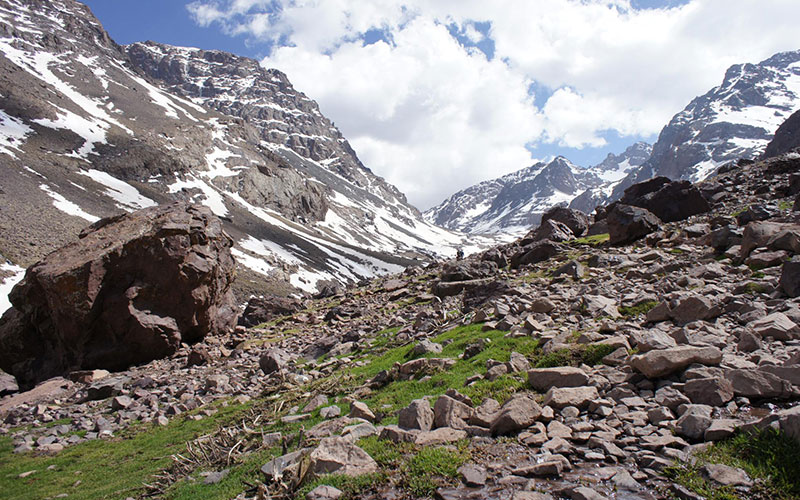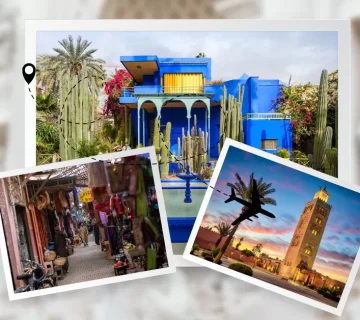Toubkal Mountain, standing tall at 4,167 metres (13,671 feet) in the High Atlas Mountains, is Morocco’s highest peak. It’s a precious destination for hikers and nature lovers. This article uncovers its beauty, reveals climbing durations, explores its ever-changing weather, and offers essential hiking tips.
Toubkal Mountain’s Magnificence

Toubkal Mountain, known as Jebel Toubkal, embodies Morocco’s natural splendour and ecological variety. Situated within the Toubkal National Park, nestled in the heart of the High Atlas range, this formidable peak graces visitors with breathtaking panoramic vistas of neighbouring valleys, quaint villages, and other neighbouring summits. Its imposing, snow-clad crown is an irresistible magnet for adventurers from all corners of the globe.
Crowned as Morocco’s highest point, Toubkal Mountain’s allure extends beyond its remarkable altitude. It serves as a visual testament to the country’s rich tapestry of landscapes and geographical diversity, inviting all who dare to explore its rugged terrain to partake in its awe-inspiring grandeur.
How Long to Climb Toubkal Mountain?
The time needed to climb Mount Toubkal varies, influenced by factors like your chosen path, personal experience, and physical fitness. Typically, reaching the summit takes approximately 2 to 3 days. Most adventurers commence their journey in the village of Imlil, which serves as the entry point to the Toubkal region. This route usually includes an overnight stop at the Toubkal Refuge, also known as Neltner Hut, allowing climbers to adapt to the altitude and break the ascent into manageable stages. The final push to the summit varies between 5 to 8 hours, contingent on your pace.
Hiking Toubkal is not just about reaching the top; it’s a journey that embraces the stunning landscapes and requires careful planning. By dividing the climb into manageable sections and considering your tempo, you can fully appreciate the majesty of Toubkal while conquering its peak.
Climbers usually opt for the following route to climb Mount Toubkal
1. Imlil to Toubkal Refuge: This hike typically takes 6-8 hours.
2. Toubkal Refuge to the Summit: This climb can be completed in 5-8 hours.
3. Descending back to Imlil: The descent is usually faster and can be done in 4-6 hours.
Toubkal Mountain Weather: Year-Round Weather
Toubkal Mountain has diverse weather, much like its landscape. It is blanketed in heavy snow in the winter, while the summer offers a more temperate climate. Here’s a seasonal breakdown of Toubkal Mountain’s weather:
1. Winter (December to February): Winters in Toubkal are harsh, with freezing temperatures and heavy snowfall. Climbing during this season is for experienced mountaineers and requires specialised gear.
2. Spring (March to May): Spring brings milder temperatures, but the mountain remains snow-covered at higher elevations. This is a popular time for hikers who want to avoid extreme cold.
3. Summer (June to August): Summer is the warmest and most accessible time to hike Toubkal. The snow recedes, clearing the paths and revealing the beautiful alpine flora. However, be prepared for the scorching sun at lower elevations.
4. Autumn (September to November): Autumn offers pleasant temperatures and colourful landscapes as the vegetation changes colour. It’s a fantastic time to visit Toubkal.
Tips to Hike Toubkal Mountain
Climbing Mount Toubkal presents challenges and extraordinary rewards, making it an adventure worth preparing for. Here’s a comprehensive set of tips to ensure you’re well-equipped for your journey:
1. Acclimatisation: Toubkal’s high altitude can be tough, especially if you need to get used to it. To adapt, consider spending a day or two in Imlil or the Toubkal Refuge before your ascent. This helps your body adjust to the thinner air and reduces the risk of altitude-related issues.
2. Physical Fitness: Tackling Toubkal demands physical preparation. Engage in regular cardiovascular exercises and strength training to get your body in shape for the trek. Strong legs, a resilient cardiovascular system, and muscular endurance will be your allies on this challenging hike.
3. Appropriate Gear: Ensure you have the right equipment for the trek. This includes warm clothing to combat the cold, sturdy and well-fitted hiking boots to support your feet, and a high-quality backpack to carry your essentials. If you plan to climb in the winter, consider bringing crampons and an ice axe for added safety on icy slopes.
4. Guide or Self-Guided: While many adventurers opt for self-guided treks, especially if they have mountain experience, it’s highly recommended, especially for less-experienced climbers, to hire a local guide. Local guides have invaluable knowledge of the terrain and weather patterns and can enhance your overall safety.
5. Hydration and Nutrition: Staying well-hydrated is crucial. Ensure you have an adequate supply of water for the hike. Additionally, pack high-energy snacks to keep your stamina up during the ascent. You can refill your water bottles with clean water available at the Toubkal Refuge.
6. Respect for the Environment: Toubkal is part of a national park, and it’s essential to be mindful of the natural surroundings. Leave no trace of your visit, and ensure you’re properly disposing of any waste. Preserve Toubkal’s beauty for generations by practising responsible and sustainable hiking.


